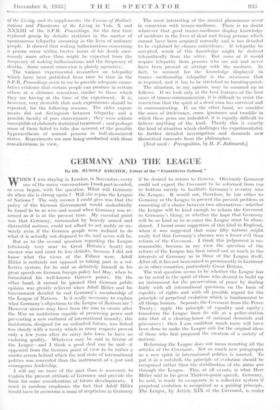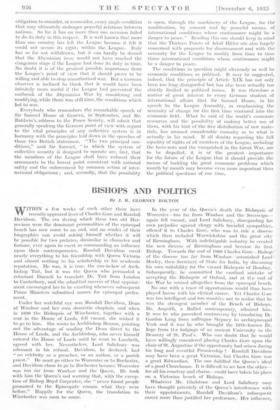GERMANY AND THE LEAGUE
By DR. RUDOLF KIRCHER, Editor of the " Frankfiirter Zeitung "
WHEN I was staying in London, in November, every one of the many conversations I took part in ended, or even began, with the question; What will Germany do when she is strong again ? Will she rejoin the League of Nations ? The only answer I could give was that the policy of the German Government would undoubtedly be found to be as wise and sound when Germany, was re- armed as it is at the present time. My essential point was that Germany, surrounded by heavily armed and distrustful nations, could not afford to act rashly or un- wisely even if the German people were inclined to do what it is actually not disposed to do, and never will be.
But as . to the second question regarding the League (obviously very near to Great Britain's heart) my answer was and must be less definite, because I did not know what the views of the Fiihrer were. Adolf Hitler is certainly not opposed to taking part in a col- lective system, for he said so definitely himself in his great speech on German foreign policy last May, when he formulated his, well-known thirteen points. On the other hand, it cannot be ignored that German public opinion was greatly relieved when Adolf Hitler and his Government decided to end Germany's membership of the League of Nations. Is it really necessary to explain what Germany's, objections to the League of Nations are ? However sincere may have been the aim to ,create after the .War an institution capable of preserving peace and preventing a .new outburst of international insanity, this institution, designed for an unlimited future, was linked too closely with a treaty which in many respects proved only a few years after its entry into force to have no enduring quality. Whatever may be said in, favour of the League—and I think a good deal can be said—it appeared from the German point of view to be rather a smoke-screen behind which the real state of international politics was concealed than the instrument of a just and courageous leadership. I will say no more of the past than is necessary to explain the present attitude of Germany and provide the basis for some consideration of future developments. I must in candour emphasise the fact that Adolf Hitler would have to oyercome a mass of scepticism in Germany, if be desired to return to Geneva. Obviously Germany could not expect the Covenant to be reformed from top to bottom merely to facilitate Germany's re-entry into the League. It would not, therefore, be fair either 'to Germany or the League to present the present problem as consisting of a choice between two alternatives—whether the League will be kind enough to reform the Covenant to Germany's liking, or whether the hope that. Germany will be so kind as to re-enter the League must be awl, doned. I heard some suggestion of this kind in England, when it was suggested that some fifty nations might easily feel that Germany's absence was a lesser evil than reform of the Covenant. I think this judgement is un- reasonable, because in my view the question of the reform of the League has been raised not so much in the interests of Germany as in those of the League itself. After all, it has not been raised as prominently in Germany as in other countries, particularly Great Britain.
The real question seems to be whether the League has so far acted in the spirit of those who desired to build up an instrument for the preservation of peace by dealing fairly with all international questions on the basis of equality of rights and with all possible regard for the principle of perpetual evolution which is fundamental to all things human. Separate the Covenant from the Peace 'Treaty ; apply the principle of equality and equity ; transform the ,League from its role as a police-station into that of a clearing-house of national demands and grievances ; then I am confident much more will have been done to make the League safe for the original ideas of those who first proposed the creation of a society of nations.
Reforming the League does not mean recasting all the articles of the Covenant. Not so much new paragraphs as a new spirit in international polities is wanted. To put it in, a nutshell, the principle of evolution should be recognised rather than the, stabilisation of the status quo through the League. This, at all events, is what Herr Hitler, said in his great Thirteen-point speech. Germany, he said, is ready to co-operate in a collective system if perpetual evolution is 'recognised as a guiding principle. The Leaguei by Article XIX of the Covenant, is tinder obligation to consider, or reconsider, every single condition that may ultimately endanger peaceful relations between nations. So far it has on more than one occasion failed to do its duty in this respect. It is well known that more than one country has left the League because it felt it could not secure its rights within the League. Italy has so far not withdrawn, but . it can hardly be denied that the Abyssinian issue would not have reached the dangerous stage if the League had done its duty in time. No doubt it is of the greatest possible importance from the League's point of view that it should prove to he willing and able to stop unauthorised war. But a German observer is inclined to think that it would have been infinitely more useful if the League had prevented the outbreak of the Abyssinian War by 'considering and modifying, while there. was still time, the conditions which led to war.
Everybody who remembers the remarkable speech of Sir Samuel Hoare at. Geneva, in September, and Mr.
• Baldwin's,address to the Peace Seciety,, will admit that generally. .speaking the German point of view with regard to the vital principles of any collective system is in .harmony with the principles laid down in the speeches of those two British statesmen. " The two principal' con ditions;" said Sir . Samuel, " in which the system of collective security is designed to operate arc, first, that the members of the League shall have reduced their armaments to the lowest point consistent with national safety and the enforcement by common action of inter- national obligations ; and, secondly, that the possibility is open, through the machinery of the League, for the modification, by consent and by peaceful means, of international conditions whose continuance might be a danger to peace." Reading this one should keep in mind that the Thirteen Points of Adolf Hitler are also largely concerned with proposals for disarmament and with the necessity for the League to modify from time to time those international conditions whose continuance might be a danger to peace., The conditions in question might obviously as well be economic conditions as political. It may be suggested, indeed, that the principle of Article XIX has not only been too long disregarded but ••has also beets actually too strictly limited to political issues. It was therefore a matter of great interest to every German student of international affairs that Sir Samuel Hoare, in his speech to the League Assembly, in emphasising the necessity of change for the first time ventured. into the economic field. What he said of the world's economic resources and the possibility of making better use of them, with his hint of.the free distribution of raw mate- rials, has aroused considerable curiosity as to what is actually in his mind. If all doubts regarding the full equality of rights of all members of.the League, including the have-nots and the vanquished. in the Great War, are to be dispelled, it is of the greatest importance for the future of the League that it should. provide the means of tackling the great economic problems which month by month may become even more important than the political questions of our time. •













































 Previous page
Previous page